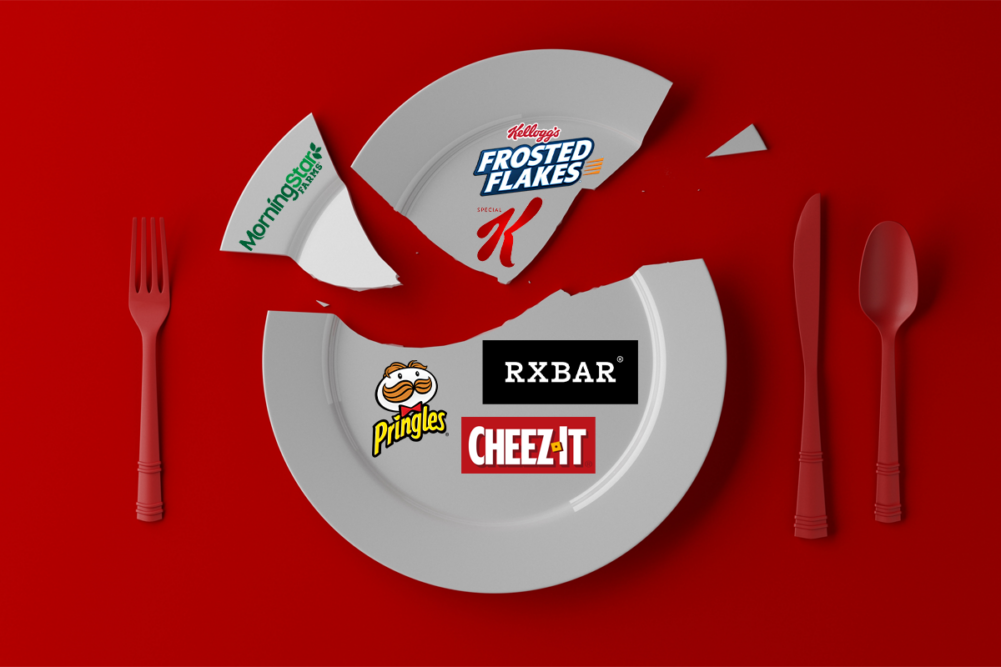BATTLE CREEK, MICH. – To listen to executives with the Kellogg Co., the rationale for breaking the business up basically comes down to one word — focus. Kellogg’s current diversified portfolio does not allow its North American cereal and plant-based foods businesses to achieve their full potential because resources are focused on growing the global snacks business.
“If you just look at the cereal business, cereal will be solely dedicated to winning in cereal in the three geographies: the Caribbean, the US and Canada,” said Steven A. Cahillane, chairman, chief executive officer and president of Kellogg Co., in a June 21 conference call to discuss the deal, which was announced earlier in the day. “And (it will) not have to compete for resources against the high-growth snacking business. So, Frosted Flakes does not have to compete with Pringles for resources.”
Under the plan, Kellogg will be broken up into three independent businesses — global snacking, North American cereal and plant-based foods — over the next 18 months. The global snacks business will include the company’s snacks, international cereal, noodles and North American frozen breakfast products portfolios.
Brands included will be Pringles, Cheez-It, Pop-Tarts, Kellogg’s Rice Krispies Treats, Nutri-Grain, RXBAR, Frosties, Zucaritas, Special K, Tresor, Krave, Coco-Pops, Crunchy Nut and Eggo. The business represents approximately 80% of Kellogg’s sales.
“Building on its track record of sales and profit growth and leveraging its portfolio of world-class brands, strong positions in attractive categories and geographic diversification, this will be a higher growth company than today’s Kellogg Co.,” Mr. Cahillane said. “Net sales growth will be aided by more focused resources and attention to brand-building, innovation and international expansion of world-class brands and to building scale in emerging markets. Profit margins are expected to expand over time, driven by operating leverage, revenue growth management, productivity and increasing emerging market scale.”
North American cereal will have about $2.4 billion in sales and include cereal brands in the United States, Canada and the Caribbean. The cereal businesses portfolio will include Kellogg’s, Frosted Flakes, Froot Loops, Mini-Wheats, Special K, Raisin Bran, Rice Krispies, Corn Flakes, Kashi and Bear Naked.
“Our priority this year has been to restore production and inventory across our SKUs (stock-keeping units) and then to resume our playbook to get back to winning in the marketplace,” Mr. Cahillane said. “And we are well on our way with total distribution points and share recovering sequentially. We’ve already gained back four share points since the beginning of this year. This speaks to the importance of these brands in the store, and it demonstrates the strong foundation from which the North America cereal company can build as an independent company.”
An independent cereal company will be able to strengthen its business through investments in its portfolio, packaging capabilities and productivity, said Mr. Cahillane.
“With this enhanced focus, North America cereal is expected to generate stable net sales over time, consistent with the category's long-term trend with improving profit margins that will drive profit growth, higher cash flow and increased return on invested capital,” he said.
The initial plan for MorningStar Farms, Kellogg’s plant-based foods business, is to spin it off, but Mr. Cahillane said the company is looking at other strategic alternatives, including a sale.
“Kellogg has grown Morningstar Farms steadily since its acquisition over 20 years ago, and the brand has the highest share in household penetration in the frozen veg/vegan components category,” he said. “This is clearly a world-class brand, and it is supported by innovative and proprietary processes and technology in a world-class manufacturing network, and it has tremendous long-term growth potential in a category that benefits from rising consumer interest in plant-based foods, both for nutrition needs and environmental reasons.”
Returning to the theme of focus, Mr. Cahillane said by spinning off plant-based will allow for resources that previously may have been diluted by priorities in other Kellogg businesses to be directed toward growth opportunities.
“This may include investing more in brand building to build consumer awareness and increase household penetration,” he said. “It may include investing more in emerging food technologies, new supply chain capabilities, extended distribution across channels and expansion into international markets.
“We see this business accelerating its sales and profit growth over time, while an unleveraged balance sheet will give it financial flexibility to pursue investments.”
When asked about the likelihood of a sale of the plant-based business versus a spinoff, Mr. Cahillane said, “we're committed to a spin, but we will also evaluate other strategic alternatives, should they present themselves. And that could happen at any time. And, so, I’d say the clock starts on this call right now, as this has gone public.”




